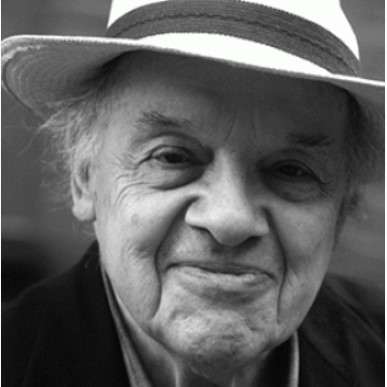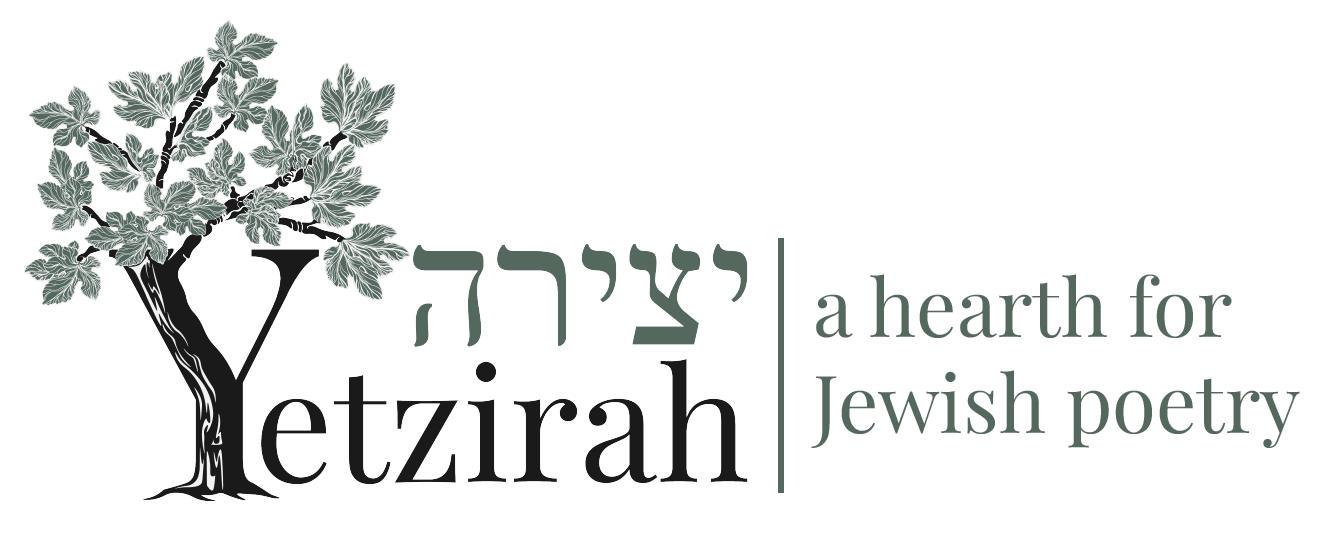
Gerald Stern
Current City, State, Country
Birth City, State, Country
Biography
Gerald Daniel Stern was born on Feb. 22, 1925, in Pittsburgh. His father, Harry, had emigrated from Ukraine as a boy, and his mother, Ida Barach Stern, had come from Poland; they both arrived in 1905, part of a wave of Jewish immigrants.
Stern and his older sister, Sylvia, spent their childhoods in Pittsburgh, Pennsylvania, growing up in a Jewish household while anti-Semitism raged rampant on the streets. During an interview with David Hamilton for the Iowa Review in 1989, Stern recalls the influence of his Jewish upbringing, citing that his grandmother (maternal) played a predominant role during the years in which she lived with his family: “We had two sets of dishes. One for, you know, dairy foods, and the other for meat dishes. We had a separate set of dishes for Passover that were unearthed and unpacked and cleaned and prepared for that holiday.”
Although the family later abandoned this Orthodox tradition for a more Conservative outlook, the years of regular service attendance, Hebrew school, and Bar Mitzvahs greatly influenced Stern’s intellectual endeavors. The effect would become greatly evident in his later work. The loss of his sister also surfaces in his work. When Stern was eight-years-old, she succumbed to a battle with cerebrospinal meningitis, and the loss stunned him. This experience and its impact are referenced often in his work.
Stern has been called an “American original,” “a sometimes comic, sometimes tragic visionary,” and, by his friend Stanley Kunitz, “the wilderness in American poetry.” Over dozens of books, and decades of teaching and activism, Stern has emerged as one of America’s most celebrated and irascible poets.
“If I could choose one poem of mine to explain my stance,” Stern told Contemporary Poets, “it would be ‘The One Thing in Life,’ which appears in Lucky Life.” According to Stern, the poem, which includes the lines “There is a sweetness buried in my mind/there is water with a small cave behind it,” makes a claim for his own inheritance and legacy: “I stake out a place for myself, so to speak, that was overlooked or ignored or disdained, a place no one else wanted.”
Stern’s poetry frequently references his all-American, working-class upbringing as well as his Jewish and Eastern European heritage. Cosmopolitan, even international in scope, and yet deeply personal, Stern’s work is known for its passionate defense of human emotions and needs. According to Jeffrey Dodd, Elise Gregory, and Adam O’Connor Rodriguez, all of whom interviewed Stern for the journal Willow Springs: “His work derides provincialism and points to a world of experiences beyond American borders and transcendent of temporal limits. Stern has lived in this rich world, and his poetry calls attention to its failures, beauties, and curiosities without fear, shame or sentimentality.”
Though Stern has declared himself “not really an internationalist,” he does identify with Eastern European poets. In his Willow Springs interview, Stern said: “My family’s only been here for 100 years. Exactly 100 years. And I grew up in Pittsburgh, American-raised, whatever the hell that means—to be American. But I realize now I’m somewhat of a foreigner.” That sense of foreignness and outsider status has permeated both Stern’s work and his career.
Though good friends with poets like Jack Gilbert, who enjoyed early success, Stern was over 50 when his first book to receive critical attention was published. His second poetry collection, Lucky Life (1977), was the Lamont Poetry Selection of the Academy of American Poets and nominated for a National Book Award. His next, The Red Coal (1981), received the Melville Caine Award from the Poetry Society of American. Subsequent collections include Leaving Another Kingdom: Selected Poems (1990); Bread Without Sugar (1992), winner of the Paterson Prize; This Time: New and Selected Poems (1998), which won the National Book Award; Last Blue (2002); American Sonnets (2002); Everything is Burning (2005); Save the Last Dance (2008); Early Collected Poems: 1965–1992 (2010), a volume collecting six of Stern’s earliest books; Galaxy Love (2017); and Blessed As We Were: Late Selected & New (2020). Stern has also written two collections of essays, including the autobiographical What I Can’t Bear Losing: Notes from a Life (2004; 2009).
Stern taught for many years at the Iowa Writers’ Workshop. He has also held positions at Temple University, New England College—where he co-founded the Masters of Fine Arts in Poetry—and Drew University.
Stern’s many awards and honors include the Wallace Stevens Award, the Bess Hokin Award, the Ruth Lilly Prize, the Bernard F. Conners Award from the Paris Review, and the Pennsylvania Governor’s Award for Excellence in the Arts. He has received fellowships from the Pennsylvania Council on the Arts, the National Endowment for the Arts, and the Guggenheim Foundation. He was Poet Laureate of New Jersey from 2000–2002. More than one critic has compared Stern to Walt Whitman, but Southern Review writer Kate Daniels articulated a different perspective: “We might like to think of [Stern] as our quintessentially Whitmanian American poet,” Daniels has stated, “but he is far too literate, too worldly to seem typically American. Perhaps it would be more accurate to think of him as a post-nuclear, multicultural Whitman for the millennium—the U.S.’s one and only truly global poet.”
One of Mr. Stern’s signature poems, which he often featured at the readings he did, was “The Dancing,” from his collection “Paradise Poems” (1984) — a bit of history, a bit of personal heritage, a lot of heart.
In all these rotten shops, in all this broken furniture
and wrinkled ties and baseball trophies and coffee pots
I have never seen a postwar Philco
with the automatic eye
nor heard Ravel’s “Bolero” the way I did
in 1945 in that tiny living room
on Beechwood Boulevard, nor danced as I did
then, my knives all flashing, my hair all streaming,
my mother red with laughter, my father cupping
his left hand under his armpit, doing the dance
of old Ukraine, the sound of his skin half drum,
half fart, the world at last a meadow,
the three of us whirling and singing, the three of us
screaming and falling, as if we were dying,
as if we could never stop — in 1945 —
in Pittsburgh, beautiful filthy Pittsburgh, home
of the evil Mellons, 5,000 miles away
from the other dancing — in Poland and Germany —
oh God of mercy, oh wild God.
“This extraordinary moment of dancing is really the liberation from the camps in 1945,” the poet and critic Edward Hirsch said of the poem in a video about Mr. Stern found on the Poetry Foundation’s website. “And suddenly you realize that this moment in Pittsburgh, this paradisial moment in Pittsburgh, is also an infernal moment, or coming out of an infernal moment, in Europe.”
In the same video, Mr. Stern talked about the work.
“We remember the famous words that after the Holocaust, after Shoah, there can be no poetry,” he said. “The alternative is, after Shoah there can be only poetry.”
(Biography courtesy of the Pennsylvania Center for the Book, Poetry Foundation, and the New York Times)
Published Works
Poetry
I. (Ayin Press, 2022)
Blessed as We Were: Late Selected and New Poems, 2000-2018 (W.W. Norton & Company, 2020)
Divine Nothingness: Poems (W. W. Norton & Company, 2014)
Early Collected Poems: 1965–1992 (W. W. Norton & Company, 2010)
Save the Last Dance: Poems (W. W. Norton & Company, 2008)
The Preacher (chapbook; Sarabande Books, 2007)
Everything Is Burning: Poems (W. W. Norton & Company, 2005)
Not God after All, drawings by Sheba Sha (Autumn House Press, 2004)
American Sonnets: Poems (W. W. Norton & Company, 2002)
Last Blue: Poems (W. W. Norton & Company, 2000)
This Time: New and Selected Poems (W. W. Norton & Company, 1998)
Odd Mercy: Poems (W. W. Norton & Company, 1995)
Bread without Sugar: Poems (W. W. Norton & Company, 1992)
Leaving Another Kingdom: Selected Poems (Harper, 1990)
New and Selected Poems (Harper, 1989)
Lovesick (Perennial Library, 1987)
Paradise Poems (Random House, 1984)
The Red Coal (Houghton Mifflin, 1981)
Lucky Life, (Houghton Mifflin, 1977)
Rejoicings: Selected Poems 1966-72 (Fiddlehead Poetry Books, New Brunswick, Canada, 1973)
The Naming of Beasts (Cummington Press, 1972)
Essay Collections
Death Watch: A View from the Tenth Decade (Trinity University Press, 2017)
Stealing History (Trinity University Press, 2012)
What I Can’t Bear Losing: Notes from a Life (W.W. Norton & Company, 2004)
Selected Essays (Harper, 1988)
Author Site
Links to Sample Works
Video Reading
Education
University of Pittsburgh, BA in Political Science, 1947
Columbia University, MA in English, 1950
